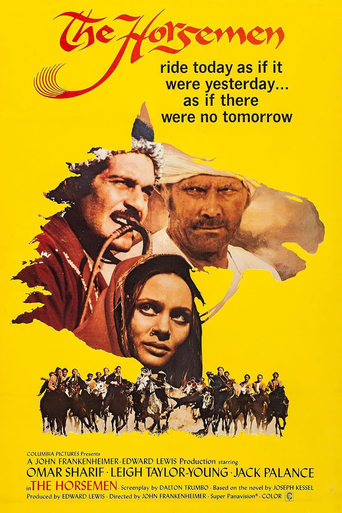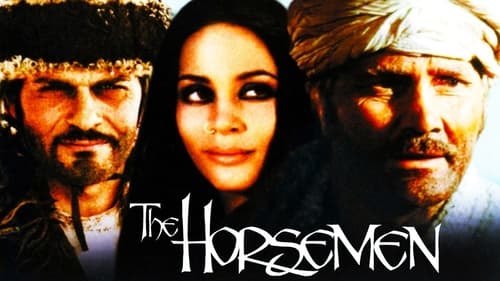hkfilmbuff
Of the handful or so films directed by John Frankenheimer that I have seen on big screen some 40 years ago, two of them had stuck in my mind. Grand Prix was, in my opinion, by far the best, and The Horsemen was a very close second.Both of these films can only be fully appreciated on BIG screen. It was so long ago, I don't remember all the details; but starting with the opening credits and the aerial shots, it was a captivating film. I remember recognizing Frankenheimer's name the very first time - I wasn't that much into the names of directors when I saw Grand Prix.The film had a raw, animalistic, beauty. The ethnicity and culture of the people reminded me of Taras Bulba. I would love to experience this film on big screen again.
Gloede_The_Saint
This is a human condition action adventure that takes place in modern time( meaning 1971) Afghanistan. The film starts by showing how far back in time they are. Everybody is riding around on horses while planes are driving above them. In this country a proud (the best word would be prince but it doesn't exactly fit) Uraz (played by Omar Sharif, mostly known as that guy who had the lead in Doctor Zhivago) sets out to this weird horse tournament on the request of his father, a elderly clan leader and master of the sport played by the great Jack Palance.It's made obvious from the start that though this man might be proud and even quite noble (he always bets on the weakest), he is in fact cruel to servants and have a rather nihilistic view on life. When he manages to fall off his horse and break his leg he feels a great dishonor and sets out to find the hardest and deadliest road home. On the way everything that is good in humans are questioned! The film has a very different view of the world than most others, at least this early in cinema. Many of the characters are so shady it will almost make you sick. I must say that I did not like these people as humans, though I did like their characters, inhuman behavior and cruelty is something I take a huge interest in. For those of you who enjoy to travel to different worlds and can enjoy and love films even if they perhaps have a different stand than your world view, this is the film for you.I was quite taken by it I must say. My second favorite Frankenheimer picture to date, meaning that I thought it was better than great films such as The Manchurian Candidate, The Train and Seven Days in May. The colors are great and the mood and pacing is very intense. Most of the frames are quite beautiful. The acting is very good! And it's philosophy as a whole is rather good too but I will not give away anything about how this film turns out but I will say that I thought it was fabulous. A genius film! A masterpiece! You should definitely check it out. A true gem!
titus24groan
Uraz, son of Tursen, the main character of the book and the movie (or is it the noble horse, Jahil?) refuses the aid of a Western style hospital in recovering from a serious leg injury sustained during the national sport of Buzkashi, circa 1960, in Royal (and feudal) Afghanistan. The book, one of the modern classics of world literature, now sells for a mere pittance on the Internet. Perhaps someday it will regain the stature and appreciation it richly deserves. Uraz, in an unforgettable adventure across the Hindu Kush (literally, eater of Hindus, for its bitter cold and unforgiving terrain) returns, fighting disgrace for having lost the competition, and fighting the disloyalty of a servant he has tempted with his money and his horse, in order to bind the servant, or syce, to the impossible task of assisting him in his return to his fathers home and training ground of great horsemen. He must also fight the treachery of a nomad woman whom he allows to accompany them, in order to further bind his male servant to the tasks ahead, and to distract him from his desire to possess the horse.The adventures met on the road back, the landscapes,scenery and populace, and the individual characters change the lives of the sojourners forever, as well as the events preceding the journey. The story of a young man facing disgrace, as well as danger from a severely septic wound, and his triumph over the adversity, as well as the price he and others pay for their youthful courage and yes, even arrogance (not the arrogance of nobility, only the arrogance of youth) is a power tale of male transformation from innocence to experience, from immaturity to the maturity of meeting adversity. The bitterness revealed in the book and only hinted at in the movie is realistic, not romanticized. The sweetness of life, of the land, and of human relationships is only underscored by thecontrast via chiaroscuro with the treachery, bitterness, jealousy, greed and foolhardiness limned in the course of the novels exposition and development. The most memorable of characters, a gypsy woman who travels with an orangutan, is sadly omitted from the movie. Other memorable characters, who turn up unexpectedly in the book (notably, Guardi Gaj, listed as Guardy Gay in the movie cast, when perhaps the true pronunciation is more Gwardi Guy (without the Americanized vowels indicated here- the R should be lightly rolled from the tip of the tongue, and all vowels should be spoken more towards the rear of the mouth, in opposition to the lazy Americanized lack of pronunciation, but perhaps a bit more like the stiff-upper lipped speech of the British) change Uraz's life for the better, and forever, and he, in exchange, gives of himself to them. Read the book. The movie cannot be lightly brushed off as a pale comparison to the book, but can only be viewed as a flawed attempt to re-create something of the masterpiece that gave it life. See it on its own merits, as you should have done for The Lord of The Rings (Peter Jackson version). See it for the landscape and the travelogue, and the exotic foreign setting. See it for its relevance to what came before the Russian and American invasions and their disastrous consequences for an ancient culture. See it for what was lost forever in the destruction of the Bamian statues. (They figure in the book, but I don't recall if they are shown in the movie---I doubt it). See it for the Band-i-Amir, the Five Lakes. Read the book for an adventure of the imagination, in which you will see the landscape from the point of view of the authors mind. The author, by the way, was one of the early French aviators of World War One, like Antoine de Saint-Exupery (The Little Prince, Wind Sand and Stars). His work is only known here in the U.S. minimally, from the French film Belle de Jour (also a novel), and the novel The Lion. Read, view, experience for yourself, don't depend on others opinions.




